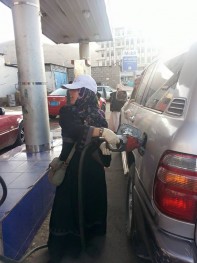
Asma al-Mohattwari
Years ago it was a shame if a woman drove a car, now women have their own petrol station. Marwa, a divorced woman and a mother of two children, depends on her car to achieve her daily activities, but the Saudi-led coalition war in Yemen has led to a huge petrol crisis. There are no cars, no buses and no taxies.
For Marwa, this was a disaster that turned her life upside down. Her biggest problem was her children. She couldn’t send them to her mother before going to work. In fact, she couldn’t even go to work because there was no transportation.
The Saudi-led coalition agreed with international aid agencies for a five-day ceasefire after 49 days of nonstop bombardments, which killed 1,600 people, injured 6,200 and displaced about half a million people since the civil conflict started on March 26th.
The ceasefire for Marwa was great news because petrol would be available. When she arrived to the station, she was surprised that hundreds of other drivers lining up in front of petrol stations in Sana’a were mostly men. She had no choice but to wait in line with them. Two days passed but her turn didn’t come, so she decided to leave.
For the first time in Yemen, Marwa heard that there is a station only for women. She couldn’t believe that the Yemeni oil company announced one of its stations for women, and two women were assigned the task of overseeing the regulation of fuel sale process for women. Marwa went there and in four hours she got forty liters of oil.
Ghofran Jamal, one of the supervisors, said that women are more organized than men. “Sometimes I met women the same as men and if they had guns they didn’t hesitate to use them, although it is a nice chance to have our own station,” she said.
Amal al-Maqathi, a car driver, said that she thought that women were weak but this idea changed in the station. “Despite the bombardments, the women didn’t care and continued struggling to get their liters of petrol.”
Omkalthom al-Shami, one of the supervisors, said that she noted that some of the women having difficulty driving their cars, as if they were driving for the first time. “I think they came just to get petrol for their husbands’ cars, because in the women’s station it is easier to get petrol.”
The rest of the station is divided according to the kind of the car, such as a station for taxies, another for private cars, a station for governmental cars, and so on. These procedures make it easier for people.







Are you kidding?
I lived in Yemen until I had to leave suddenly because of the Saudi war. The ratio of women who drive cars in Yemen to those of men looked to me like 1 to 1 million. I kid you not! Which means that there are only 25 women who drive cars … may be 50 maximum … ok … may be 100 in the entire country. I kid you not!